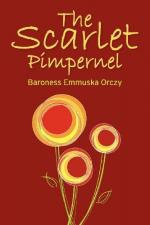“Am I to understand, citizen,” he said, “that my orders are not to let anyone pass through these gates to-night?”
“No, no, citizen,” replied Marat, “we dare not do that. There are a number of good patriots in the city still. We cannot interfere with their liberty or—”
And the look of fear of the demagogue—himself afraid of the human whirlpool which he has let loose—stole into Marat’s cruel, piercing eyes.
“No, no,” he reiterated more emphatically, “we cannot disregard the passports issued by the Committee of Public Safety. But examine each passport carefully, citizen Bibot! If you have any reasonable ground for suspicion, detain the holder, and if you have not——”
The sound of singing was quite near now. With another wink and a final leer, Marat drew back under the shadow of the cabaret, and Bibot swaggered up to the main entrance of the gate.
“Qui va la?” he thundered in stentorian tones as a group of some half-dozen people lurched towards him out of the gloom, still shouting hoarsely their ribald drinking song.
The foremost man in the group paused opposite citizen Bibot, and with arms akimbo, and legs planted well apart tried to assume a rigidity of attitude which apparently was somewhat foreign to him at this moment.
“Good patriots, citizen,” he said in a thick voice which he vainly tried to render steady.
“What do you want?” queried Bibot.
“To be allowed to go on our way unmolested.”
“What is your way?”
“Through the Porte Montmartre to the village of Barency.”
“What is your business there?”
This query delivered in Bibot’s most pompous manner seemed vastly to amuse the rowdy crowd. He who was the spokesman turned to his friends and shouted hilariously:
“Hark at him, citizens! He asks me what is our business. Ohe, citizen Bibot, since when have you become blind? A dolt you’ve always been, else you had not asked the question.”
But Bibot, undeterred by the man’s drunken insolence, retorted gruffly:
“Your business, I want to know.” “Bibot! my little Bibot!” cooed the bibulous orator now in dulcet tones, “dost not know us, my good Bibot? Yet we all know thee, citizen—Captain Bibot of the Town Guard, eh, citizens! Three cheers for the citizen captain!”
When the noisy shouts and cheers from half a dozen hoarse throats had died down, Bibot, without more ado, turned to his own men at the gate.
“Drive these drunken louts away!” he commanded; “no one is allowed to loiter here.”
Loud protest on the part of the hilarious crowd followed, then a slight scuffle with the bayonets of the Town Guard. Finally the spokesman, somewhat sobered, once more appealed to Bibot.
“Citizen Bibot! you must be blind not to know me and my mates! And let me tell you that you are doing yourself a deal of harm by interfering with the citizens of the Republic in the proper discharge of their duties, and by disregarding their rights of egress through this gate, a right confirmed by passports signed by two members of the Committee of Public Safety.”




